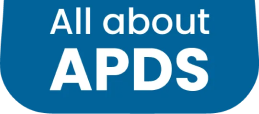Antibodies – proteins made by B cells of the immune system. The antibodies bind with foreign objects like bacteria, viruses and toxins. They latch onto them and destroy them by recruiting the other components of the immune system. One way to examine if you have healthy antibody responses is to give you a vaccine and measure the antibodies you produce in response to the vaccine. This measurement is often referred to as “titer.”
APDS (Activated PI3K Delta Syndrome) – a rare primary immunodeficiency caused by variations in the PIK3CD or PIK3R1 genes. These variations cause B and T cells to function improperly, resulting in infections, trouble breathing, swollen lymph nodes, an enlarged spleen or liver, digestive tract issues, low numbers of blood cells, conditions where the immune system mistakenly attacks the body such as arthritis or eczema, and even lymphoma.
B-lymphocytes (B cells) – immune cells from the bone marrow that produce antibodies. (The “B” in B cell is for bone.) They fight specific foreign objects that enter the body. One way B cells accomplish this is by making antibodies.
Bronchiectasis – a condition where the bronchial tubes in your lungs widen and thicken. This makes them inelastic. It’s also easier for bacteria and mucus to accumulate in the widened spaces. The result is frequent infections and permanent damage to the lungs. This damage can cause coughing up mucus, and chest pain.
CD4+ T cells – a type of immune cell that stimulates killer T cells, macrophages, and B cells to make immune responses. A CD4-positive T lymphocyte is a type of white blood cell and a type of lymphocyte. Also called helper T cell.
CD8+ T cells – also known as cytotoxic T cells, this type of T cell destroys specific foreign objects like bacteria or viruses. People with APDS often have high numbers of CD8+ T cells that are old and don’t work as well anymore.
Common Variable Immune Deficiency (CVID) – a group of primary immunodeficiencies with a wide range of symptoms that resemble APDS. It is one of the most common primary immunodeficiencies and is usually diagnosed in adults. Some people with APDS are misdiagnosed as having CVID.
Enteropathy – any disease of the intestines – small intestine and large intestine (known as colon). Typical manifestations of enteropathy in APDS are diarrhea, the inability to absorb nutrients from food, or inflammation of the intestine.
Flow cytometry – a laboratory method used to detect, identify, and count specific cells. Flow cytometry involves adding a light-sensitive dye to cells. The dyed cells are passed through a beam of light in a machine. The machine measures the number of cells, things like the size and shape of the cells, and other unique features of cells. Flow cytometry may be used on cells from circulating (peripheral) blood, bone marrow, or a biopsy. The most common use of flow cytometry is in the identification of markers on cells, particularly in the immune system (called immunophenotyping).
Genetic Testing – a medical test that looks at your DNA for any variations in genes. Genes act as instructions to make proteins, which carry out functions in your body. Some gene variations lead to disease. Genetic testing is used to identify these cases. The results of a genetic test can confirm or rule out a suspected genetic condition or help determine a person’s chance of developing or passing on a genetic disorder to their children.
Glomerulonephritis – disorder of glomeruli (clusters of microscopic blood vessels in the kidneys with small pores through which blood is filtered). It is characterized by body tissue swelling (edema), high blood pressure, and the presence of red blood cells in the urine.
Immunoglobulin A (IgA) – antibodies that protect your respiratory tract (the organs you use to breathe) and your digestive system (the organs you use to eat and digest food) from infections. You have IgA antibodies in your blood, saliva, and gastric “juices.” Sometimes people with APDS have low levels of IgA.
Immunoglobulin G (IgG) – antibodies that are very important for fighting infections from bacteria and viruses. Most of the immunoglobulins in your blood are IgG. You also have some IgG antibodies in all your body fluids. Your body keeps a “blueprint” of all the IgG antibodies you have made. That way, if you are exposed to the same germs again, your immune system can quickly make more antibodies. Some people with APDS have low levels of IgG.
Immunoglobulin M (IgM) – these antibodies are the first immunoglobulins your body makes after you are exposed to germs. They provide short-term protection while your body makes other antibodies. IgM antibodies are in your blood and lymph fluid (a watery fluid that carries the cells that fight infections and diseases to all parts of your body). People with APDS have been reported to have high levels of IgM.
Lymphoma – cancer of lymphocytes, which reside in the lymphatic system and in blood-forming organs.
Lymphoproliferation – overproduction of B and T cells. It can appear as swollen tonsils, swollen lymph nodes, an enlarged spleen or liver. People with APDS have been affected by lymphoproliferation.
Memory B cells – Once B cells and T cells are formed, a few of those cells will multiply and provide “memory” for your immune system. This allows your immune system to respond faster and more efficiently the next time you are exposed to the same foreign object. In many cases, it will prevent you from getting sick. People with APDS often have low numbers of memory B cells.
PASLI – p110 delta-activating mutation causing senescent T cells, lymphadenopathy, and immunodeficiency. This was the first name used to describe what we now call APDS.
PIK3CD and PIK3R1 genes – genes involved in making parts of the PI3K delta protein that is important for immune cell development and function.
Primary immunodeficiencies (PI) – rare genetic disorders that impair the immune system. Without a functional immune response, people with PIs may be subject to chronic, debilitating infections, and other symptoms such as swollen lymph nodes/spleen or autoimmunity. Primary means it’s genetic, so the immune impairments are present from birth.
Transitional B cells – immature B cells that are not able to carry out B cell functions yet. People with APDS have been reported to have high levels of transitional B cells. This means that many of their B cells do not mature correctly. This is one of the causes of low antibodies because an immature B cell cannot function properly and produce sufficient immunoglobulins.

